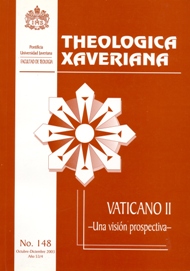Abstract
Se presenta a lo largo del artículo tanto la vigencia como la prospectiva que el Concilio Ecuménico Vaticano Segundo mantiene en la vida de la Iglesia y de su entorno sociocultural. Se pretende con el artículo revitalizar la nueva concepción eclesiológica que maduró el Concilio y que sirvió para comprender desde diversas dimensiones, no sólo la fe y las culturas, sino ante todo el diálogo que debe haber entre ellas, para que la ciencia entre en relación con la teología desde la universidad misma. Se plantean interrogantes de tipo teológico pero también universitario para mostrar la importancia de una nueva presencia eclesial en el mundo universitario, de tal forma que se logre la evangelización de la inteligencia así como la evangelización de las culturas en el medio en el cual se están creando y desarrollando.This journal is registered under a Creative Commons Attribution 4.0 International Public License. Thus, this work may be reproduced, distributed, and publicly shared in digital format, as long as the names of the authors and Pontificia Universidad Javeriana are acknowledged. Others are allowed to quote, adapt, transform, auto-archive, republish, and create based on this material, for any purpose (even commercial ones), provided the authorship is duly acknowledged, a link to the original work is provided, and it is specified if changes have been made. Pontificia Universidad Javeriana does not hold the rights of published works and the authors are solely responsible for the contents of their works; they keep the moral, intellectual, privacy, and publicity rights.
Approving the intervention of the work (review, copy-editing, translation, layout) and the following outreach, are granted through an use license and not through an assignment of rights. This means the journal and Pontificia Universidad Javeriana cannot be held responsible for any ethical malpractice by the authors. As a consequence of the protection granted by the use license, the journal is not required to publish recantations or modify information already published, unless the errata stems from the editorial management process. Publishing contents in this journal does not generate royalties for contributors.


